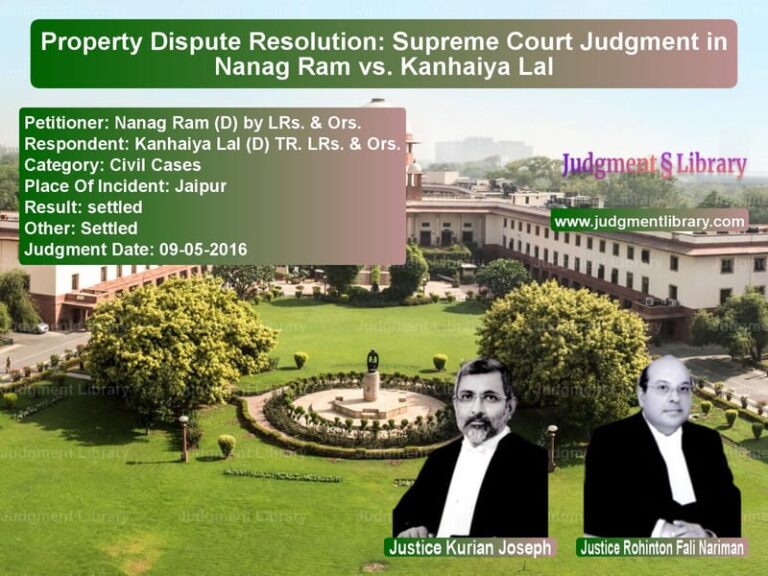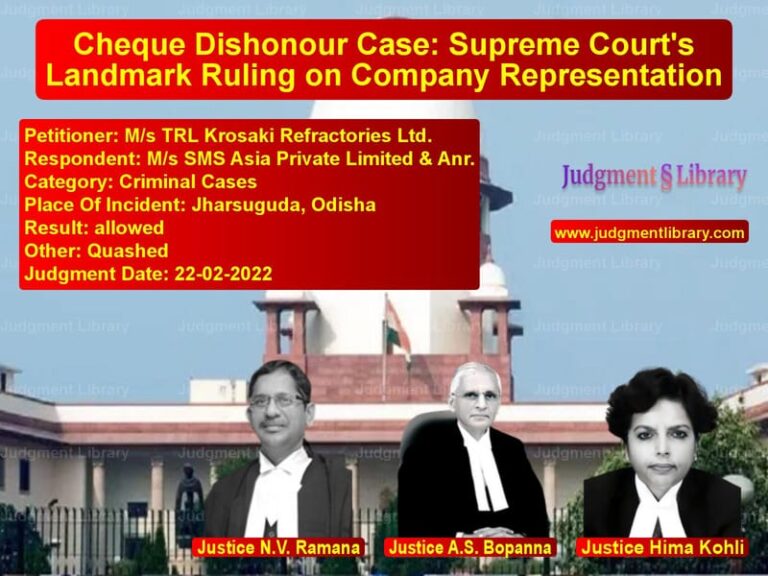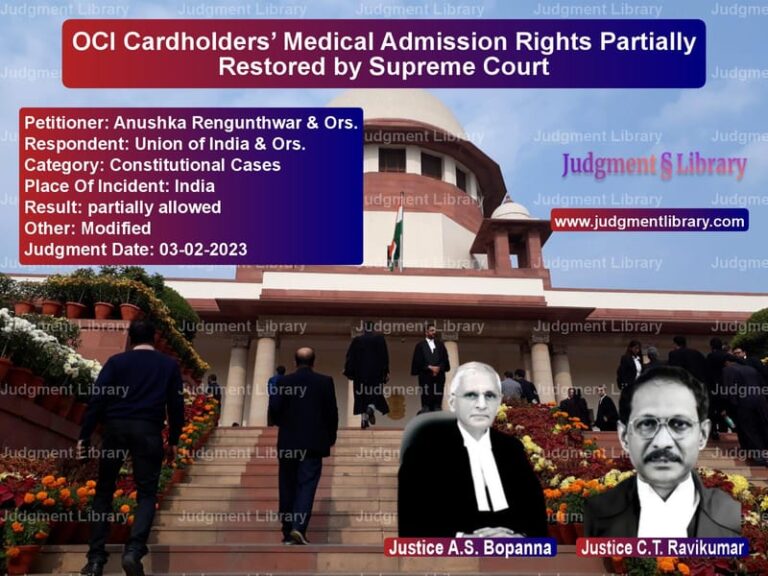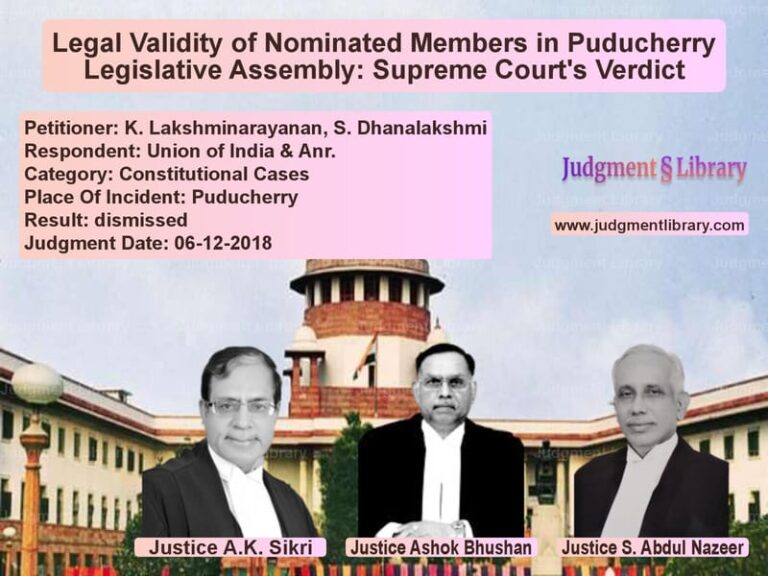Supreme Court Ensures Equal Pension Rights for High Court Judges from Bar and District Judiciary
The Supreme Court of India recently ruled in Justice Shailendra Singh & Ors. vs. Union of India & Ors., reinforcing the principle of non-discrimination among High Court judges regarding pension and provident fund benefits. The judgment quashed a government directive that denied judges promoted from the district judiciary the same General Provident Fund (GPF) benefits as those appointed from the Bar.
Background of the Case
The petition was filed by eight judges of the Patna High Court who were earlier appointed as District Judges on April 15, 2010. They were elevated to the High Court on June 4, 2022, and November 22, 2023, respectively. Their grievance arose from a communication dated December 13, 2022, issued by the Union Ministry of Law and Justice, which stated that they would not be entitled to subscribe to the General Provident Fund.
Key Legal Issues
- Whether judges elevated from the district judiciary should be denied GPF benefits while their counterparts from the Bar enjoy them.
- Whether Article 221 of the Constitution allows different service conditions for High Court judges based on their source of appointment.
- Whether the government’s policy violates judicial independence and financial security principles.
Petitioners’ Arguments
The petitioners contended that:
- The Constitution does not classify High Court judges into different groups based on their source of appointment.
- Article 216 states that all High Court judges form a single class, and differentiating between them violates Article 14.
- The denial of GPF benefits based on prior service under the National Pension Scheme (NPS) unfairly discriminates against judges promoted from the district judiciary.
- Financial independence is essential for judicial independence, and creating a subclass within the judiciary undermines it.
Respondent’s Arguments
The Attorney General for India defended the government’s stance, arguing that:
- The proviso to Section 20 of the High Court Judges (Salaries and Conditions of Service) Act, 1954, states that judges who previously held pensionable posts should continue under the same pension scheme.
- Since district judges appointed after April 1, 2004, are covered by the NPS, they should not be eligible for GPF benefits.
- The government cannot transfer contributions from the NPS to GPF accounts, as it would contradict existing policy regulations.
Supreme Court’s Observations
1. High Court Judges Form a Homogeneous Class
The Court ruled that Article 216 establishes High Court judges as a single class, stating:
“Once appointed to the High Court, all judges rank equally, irrespective of whether they were drawn from the Bar or the district judiciary.”
Thus, differentiating between them in matters of financial benefits is unconstitutional.
2. Judicial Independence Requires Financial Security
The Court emphasized that financial security is a fundamental aspect of judicial independence. It cited the case All India Judges Association vs. Union of India, where it was held that:
“Financial dignity during and after service is essential for judicial independence. A judge’s post-retirement benefits must ensure that they can lead a dignified life.”
3. The Proviso to Section 20 Should Be Read in Favor of Judges
The Court clarified that the proviso to Section 20 of the 1954 Act was meant to allow continuity in provident fund subscriptions, not to restrict High Court judges from availing of GPF benefits:
“The proviso should be interpreted to permit district judges to continue their contributions, not to deny them a benefit available to all High Court judges.”
4. Precedents on Equal Treatment of Judges
The Court cited P. Ramakrishnam Raju vs. Union of India, which held:
“All judges, irrespective of their source of appointment, should receive equal pensions. ‘One rank, one pension’ must be the guiding principle.”
Similarly, in Union of India vs. Justice (Retd) Raj Rahul Garg, the Court ruled that:
“A judge promoted from the district judiciary cannot be given lower pension benefits than a judge appointed from the Bar.”
Final Judgment
The Supreme Court ruled in favor of the petitioners, stating:
- The communication from the Union Government dated December 13, 2022, is quashed.
- All High Court judges, regardless of their source of appointment, must be allowed to subscribe to the General Provident Fund.
- The amounts deposited in the New Pension Scheme shall be refunded to the petitioners within four weeks.
Implications of the Judgment
This ruling has significant consequences for the judiciary and public administration:
- Ensures Equality Among High Court Judges: It prevents discrimination based on the source of appointment.
- Strengthens Judicial Independence: By guaranteeing financial security, the Court upholds judicial independence.
- Sets a Precedent for Other Government Employees: It may impact similar cases where employees are denied benefits based on past service conditions.
- Clarifies the Scope of the 1954 Act: The judgment provides a clear interpretation of Section 20, ensuring uniformity in pension benefits.
This landmark judgment reinforces the principle that financial benefits for High Court judges must be uniform, ensuring equality, dignity, and independence for all members of the judiciary.
Petitioner Name: Justice Shailendra Singh & Ors..Respondent Name: Union of India & Ors..Judgment By: Justice Dhananjaya Y Chandrachud, Justice J B Pardiwala, Justice Manoj Misra.Place Of Incident: Patna, Bihar.Judgment Date: 05-11-2024.
Don’t miss out on the full details! Download the complete judgment in PDF format below and gain valuable insights instantly!
Download Judgment: justice-shailendra-s-vs-union-of-india-&-ors-supreme-court-of-india-judgment-dated-05-11-2024.pdf
Directly Download Judgment: Directly download this Judgment
See all petitions in Fundamental Rights
See all petitions in Constitution Interpretation
See all petitions in Separation of Powers
See all petitions in Public Interest Litigation
See all petitions in Judgment by Dhananjaya Y Chandrachud
See all petitions in Judgment by J.B. Pardiwala
See all petitions in Judgment by Manoj Misra
See all petitions in allowed
See all petitions in Quashed
See all petitions in supreme court of India judgments November 2024
See all petitions in 2024 judgments
See all posts in Constitutional Cases Category
See all allowed petitions in Constitutional Cases Category
See all Dismissed petitions in Constitutional Cases Category
See all partially allowed petitions in Constitutional Cases Category







